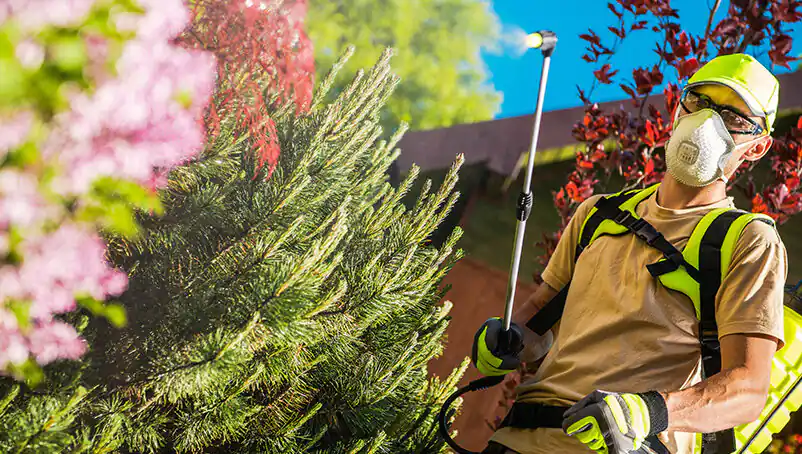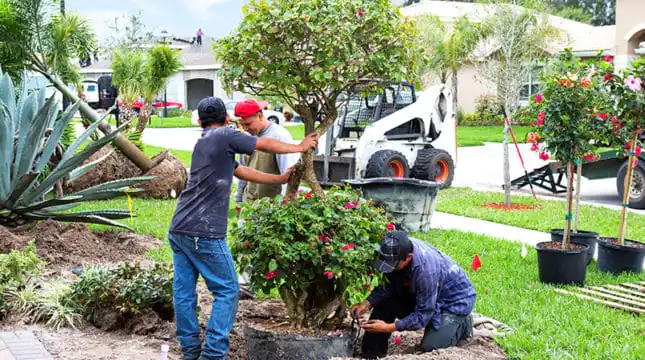Minnesota
License required: No
Licensing authority: None
Minnesota does not issue a general statewide landscaping license. However, landscapers working on Minnesota Department of Transportation (MnDOT) projects or rights-of-way must hold a Landscape Specialist certification to install or supervise the installation and establishment of plants. This certification requires completing an approved course and passing an exam.
If you apply pesticides as part of your lawn care or landscaping services, you must also hold a Commercial Pesticide Applicator license from the Minnesota Department of Agriculture. To qualify, you must pass the core exam and the appropriate category exam and meet the state’s financial responsibility requirements.
Required business insurance in Minnesota:
- Workers’ compensation insurance is required for landscaping businesses with one or more employees
- General liability insurance is not required by the state for landscapers but is recommended and often required for commercial or government contracts and can help protect your business from third-party injuries or property damage
Mississippi
License required: Yes (for landscaping services beyond lawn maintenance)
Licensing authority: Mississippi Department of Agriculture and Commerce — Bureau of Plant Industry
Mississippi distinguishes between basic lawn maintenance and landscaping services. Businesses that only perform lawn maintenance such as mowing or fertilizing do not need a state license but may not advertise as landscapers.
Landscapers who install or replace plants must hold a Landscape Horticulturist license, which requires passing an exam and submitting a $1,000 surety bond. Tree-focused work requires a Tree Surgery license, which covers pruning, trimming, fertilizing and tree removal and requires passing an exam and showing proof of liability insurance.
If you apply restricted-use pesticides as part of your landscaping services, you must also hold a Commercial Pesticide Applicator license. Certification requires passing the core exam and the appropriate category exam before applying pesticides commercially.
Required business insurance in Mississippi:
Missouri
License required: No
Licensing authority: None
Missouri does not require a statewide landscaping license for mowing, planting or landscape maintenance. A state credential is only required if you apply pesticides as part of your landscaping services.
To apply pesticides commercially, you must hold a Commercial Applicator Certification from the Missouri Department of Agriculture. Certification requires passing the Core exam and the appropriate Category exam, along with providing proof of financial responsibility such as insurance or a surety bond.
Required business insurance in Missouri:
- Workers’ compensation insurance is required for landscaping businesses with one or more employees.
- General liability insurance is not required by the state for landscapers but is recommended and often required for commercial clients. It can help protect your business from third-party injuries or property damage.
Montana
License required: No
Licensing authority: None
Montana does not require a statewide landscaping license for general landscape maintenance or installation work. A state credential is only required if you apply pesticides as part of your services.
To apply pesticides commercially, you must obtain a Commercial Pesticide Applicator license from the Montana Department of Agriculture. Certification requires passing the Core exam and the appropriate Category exam, and applicants must show proof of business liability insurance and maintain a surety bond as part of the licensing process.
Required business insurance in Montana:
Nebraska
License required: No
Licensing authority: None
Nebraska does not require a statewide landscaping license for general landscaping or lawn maintenance work. A state license is only required if you apply lawn care pesticides as part of your services.
To apply pesticides commercially, you must hold a Commercial Pesticide Applicator license from the Nebraska Department of Agriculture. Nebraska offers multiple certification categories and subcategories, and applicators must pass the General Standards exam along with at least one applicable Category exam before applying pesticides.
Required business insurance in Nebraska:
- Workers’ compensation insurance is required for landscaping businesses with one or more employees.
- General liability insurance is not required by the state for landscapers but is recommended and often required for commercial clients. It can help protect your business from third-party injuries or property damage.
Nevada
License required: Yes (based on project value or scope)
Licensing authority: Nevada State Contractors Board
Nevada requires landscapers to hold a state contractor license if the work is valued at $1,000 or more or requires a building permit. Basic lawn maintenance may not require a license, but landscaping work that includes installing rocks, sand or gravel, planting trees or shrubs or laying sod or hydroseeding does. In these cases, landscapers must hold a C-10 Landscape Contracting license issued by the Nevada State Contractors Board.
To qualify, applicants must document four years of experience within the past ten years, pass both the trade exam and the business and law exam, and show proof of required Nevada business insurance.
If you apply or supervise the application of restricted-use pesticides, you must also be certified by the Nevada Department of Agriculture. Certification requires passing the appropriate pesticide applicator exam before performing pesticide work.
Required business insurance in Nevada:
New Hampshire
License required: No
Licensing authority: None
New Hampshire does not require a statewide landscaping license for general landscaping or lawn maintenance work. If you apply pesticides as part of your landscaping services, you will need a license.
To apply pesticides commercially, you must hold a Pesticide Applicator License from the New Hampshire Department of Agriculture, Markets and Food. Certification requires completing a 16-hour training course, passing both a written and oral exam, and showing proof of liability insurance before you can apply pesticides legally.
Required business insurance in New Hampshire:
New Jersey
License required: Yes (registration)
Licensing authority: New Jersey Division of Consumer Affairs
New Jersey does not require a traditional landscaper trade license, but landscapers who perform more than basic lawn maintenance must register with the Division of Consumer Affairs as a Home Improvement Contractor. Registration is required for work such as planting flowers, shrubs or trees, laying sod or establishing a lawn. Businesses that only mow lawns or trim shrubs generally do not need to register.
If you apply pesticides as part of your landscaping or lawn care services, you must hold a Commercial Pesticide Applicator license from the New Jersey Department of Environmental Protection. Certification requires passing a core exam and a category exam, along with completing 40 hours of supervised on-the-job training for each category you apply for.
Required business insurance in New Jersey:
New Mexico
License required: Local only
Licensing authority: Local city or county licensing offices
New Mexico does not require a statewide landscaping license, though some cities and counties have local licensing or business registration rules. A state license is only required if you apply pesticides as part of your landscaping or lawn care services.
To apply pesticides commercially, you must hold a Commercial Applicator license from the New Mexico Department of Agriculture. Applicants must show two years of pesticide application experience or 20 college credit hours plus one year of experience, pass the core exam and at least one category exam, and provide proof of financial responsibility such as liability insurance or a surety bond.
Required business insurance in New Mexico:
New York
License required: Local only
Licensing authority: Local city or county licensing offices
New York does not require a statewide landscaping license, but many cities and counties have local licensing or registration requirements. Landscapers should check local rules before beginning work.
If you apply pesticides as part of your landscaping or lawn care services, you must hold a Commercial Pesticide Applicator Certification from the New York State Department of Environmental Conservation.
Applicants must document qualifying experience within the past five years, such as working as a pesticide technician, apprentice or in pesticide sales with technical knowledge. Commercial applicators must also pass the core exam and the appropriate category exam.
New York also licenses Commercial Pesticide Technicians, who apply pesticides under the supervision of a certified applicator.
Required business insurance in New York:
- Workers’ compensation insurance is required for landscaping businesses with one or more employees.
- General liability insurance is not required by the state for landscapers but is often required for commercial clients and can help protect your business from third-party injuries or property damage.
North Carolina
License required: Yes (for certain landscaping activities)
Licensing authority: North Carolina Landscape Contractors’ Licensing Board
North Carolina requires a Landscape Contractor license for landscaping work that involves planting, repairing or managing gardens, lawns, shrubs, vines, trees or other decorative vegetation. This license does not apply to services such as clearing or grading land, arboriculture, sod installation, lawn mowing, turf management or general lawn care. To qualify, applicants must pass the state exam and show proof of a required surety bond.
If you apply pesticides as part of your landscaping services, you must also hold a Commercial Pesticide Applicator license from the North Carolina Department of Agriculture and Consumer Services. Certification requires passing the appropriate pesticide applicator exam before you can apply pesticides commercially.
Required business insurance in North Carolina:
- Workers’ compensation insurance is required for landscaping businesses with three or more employees.
- General liability insurance is not required by the state for landscapers but is often required for commercial contracts and can help protect your business from third-party injuries or property damage.
North Dakota
License required: No
Licensing authority: None
North Dakota does not require a statewide landscaping license for general landscaping or lawn maintenance work. If you apply pesticides as part of your services, you will need a license.
To apply pesticides commercially, you must hold a Commercial Pesticide Applicator license from the North Dakota Department of Agriculture. Certification requires passing the core exam and at least one category exam, and applicants must show proof of financial responsibility such as liability insurance or a surety bond.
Required business insurance in North Dakota:
- Workers’ compensation insurance is required for landscaping businesses with one or more employees.
- General liability insurance is not required by the state for landscapers but is recommended and often required for commercial clients. It can help protect your business from third-party injuries or property damage.







